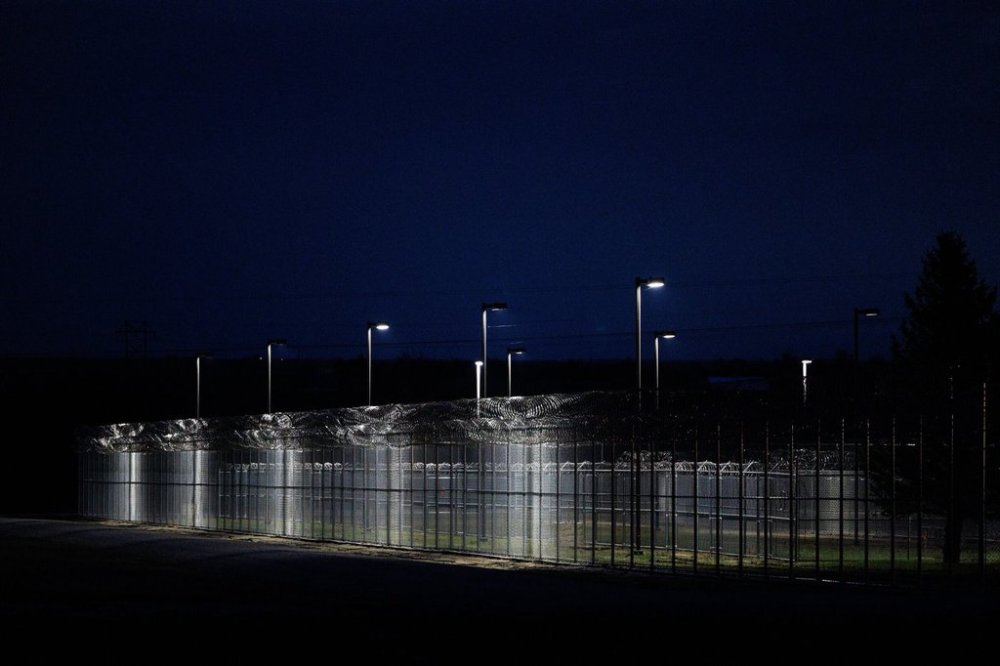Nebraska prison reopens as federal immigration center, aims for 200 detainees by Thanksgiving
Advertisement
Read this article for free:
or
Already have an account? Log in here »
To continue reading, please subscribe:
Monthly Digital Subscription
$0 for the first 4 weeks*
- Enjoy unlimited reading on winnipegfreepress.com
- Read the E-Edition, our digital replica newspaper
- Access News Break, our award-winning app
- Play interactive puzzles
*No charge for 4 weeks then price increases to the regular rate of $19.00 plus GST every four weeks. Offer available to new and qualified returning subscribers only. Cancel any time.
Monthly Digital Subscription
$4.75/week*
- Enjoy unlimited reading on winnipegfreepress.com
- Read the E-Edition, our digital replica newspaper
- Access News Break, our award-winning app
- Play interactive puzzles
*Billed as $19 plus GST every four weeks. Cancel any time.
To continue reading, please subscribe:
Add Free Press access to your Brandon Sun subscription for only an additional
$1 for the first 4 weeks*
*Your next subscription payment will increase by $1.00 and you will be charged $16.99 plus GST for four weeks. After four weeks, your payment will increase to $23.99 plus GST every four weeks.
Read unlimited articles for free today:
or
Already have an account? Log in here »
OMAHA, Neb. (AP) — A minimum-security state prison in the remote southwest corner of Nebraska reconfigured to serve as a federal immigration detention center began accepting detainees earlier this week, Gov. Jim Pillen said Thursday.
The Republican governor said the facility at McCook — a remote city of about 7,000 people in the middle of wide-open prairies between Denver and Omaha — had between 50 and 60 immigrant detainees as of Thursday. The facility should be at capacity — currently 200 — by Thanksgiving, Pillen said.
Work is already set to begin on the second phase of the conversion, which would expand the facility to accommodate another 100 beds for a total of 300, he said.

“I would expect that the second phase will be ready in the first part of the new year,” he said.
The facility had served as the McCook Work Ethic Camp, which had housed around 180 low-level offenders who participated in education, treatment and work programs to help them transition to life outside prison. Prisoners there routinely worked on roads, in parks, county and city offices and even local schools, and the program was often praised by state leaders as a success story for reducing prisoner recidivism.
Those low-level offenders have been moved out of the McCook prison. Several were paroled, placed on probation or simply released, but the majority were sent to other facilities, including more than 100 sent to community corrections in Omaha and Lincoln. Dozens of others were sent to other state prisons.
McCook is about 210 miles (338 kilometers) west of Lincoln, the state capital.
McCook officials and residents were taken by surprise when Pillen announced in August that he was handing the prison over for use by federal authorities as part of President Donald Trump’s sweeping crackdown on immigration.
Nebraska and U.S. Department of Homeland Security officials have dubbed the facility the “ Cornhusker Clink,” a play on Nebraska’s nickname of the Cornhusker State and an old slang term for jail. The alliterative name follows in the vein of the previously announced “ Alligator Alcatraz ” and “Deportation Depot” detention centers in Florida and the “ Speedway Slammer ” in Indiana.
Some Nebraska lawmakers have complained that Pillen, a Republican, acted rashly, noting that the state’s prison system is already one of the nation’s most overcrowded and perpetually understaffed.
To that end, former state Sen. DiAnna Schimek and thirteen other McCook residents have sued Pillen and the director of the state prison system, saying only the Legislature has the constitutional authority to control or manage state prisons or repurpose the use of public buildings.
The lawsuit, filed in state court on the residents’ behalf by nonprofit legal advocacy group Nebraska Appleseed, had sought a temporary injunction to stop the conversion of the McCook prison while the case plays out, but a judge rejected that motion last month. Likewise, the judge also rejected Pillen’s motion to dismiss the case.
Nearly 60,000 people were being held in immigration detention by mid-September — a 51% increase since January, according to the nonprofit Transactional Records Access Clearinghouse.
About 70% of those detained have no criminal record, TRAC says. Many others have convictions for offenses as minor as a traffic violation.

